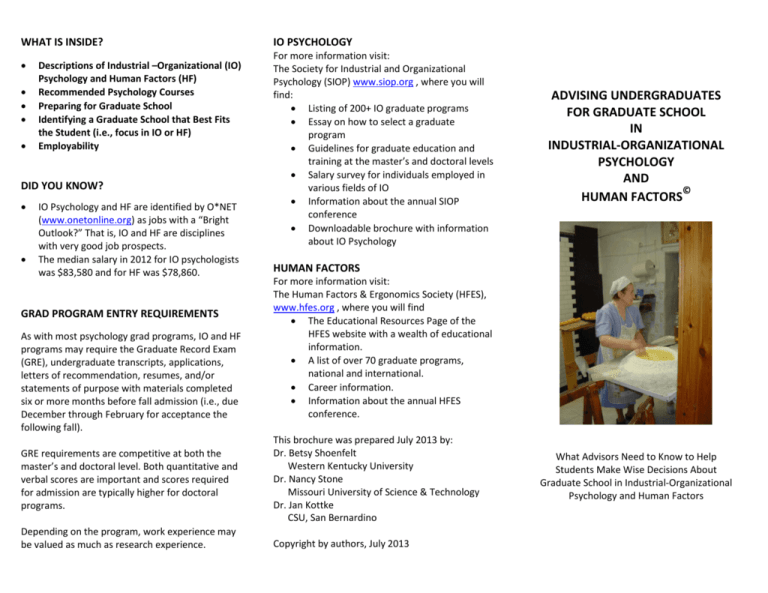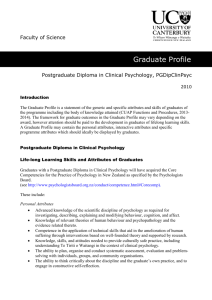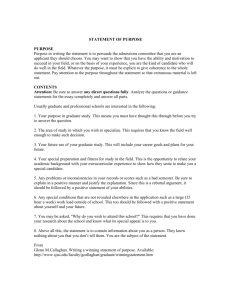advising undergraduates for graduate school in industrial
advertisement

WHAT IS INSIDE? Descriptions of Industrial –Organizational (IO) Psychology and Human Factors (HF) Recommended Psychology Courses Preparing for Graduate School Identifying a Graduate School that Best Fits the Student (i.e., focus in IO or HF) Employability DID YOU KNOW? IO Psychology and HF are identified by O*NET (www.onetonline.org) as jobs with a “Bright Outlook?” That is, IO and HF are disciplines with very good job prospects. The median salary in 2012 for IO psychologists was $83,580 and for HF was $78,860. GRAD PROGRAM ENTRY REQUIREMENTS As with most psychology grad programs, IO and HF programs may require the Graduate Record Exam (GRE), undergraduate transcripts, applications, letters of recommendation, resumes, and/or statements of purpose with materials completed six or more months before fall admission (i.e., due December through February for acceptance the following fall). GRE requirements are competitive at both the master’s and doctoral level. Both quantitative and verbal scores are important and scores required for admission are typically higher for doctoral programs. Depending on the program, work experience may be valued as much as research experience. IO PSYCHOLOGY For more information visit: The Society for Industrial and Organizational Psychology (SIOP) www.siop.org , where you will find: Listing of 200+ IO graduate programs Essay on how to select a graduate program Guidelines for graduate education and training at the master’s and doctoral levels Salary survey for individuals employed in various fields of IO Information about the annual SIOP conference Downloadable brochure with information about IO Psychology ADVISING UNDERGRADUATES FOR GRADUATE SCHOOL IN INDUSTRIAL-ORGANIZATIONAL PSYCHOLOGY AND © HUMAN FACTORS HUMAN FACTORS For more information visit: The Human Factors & Ergonomics Society (HFES), www.hfes.org , where you will find The Educational Resources Page of the HFES website with a wealth of educational information. A list of over 70 graduate programs, national and international. Career information. Information about the annual HFES conference. This brochure was prepared July 2013 by: Dr. Betsy Shoenfelt Western Kentucky University Dr. Nancy Stone Missouri University of Science & Technology Dr. Jan Kottke CSU, San Bernardino Copyright by authors, July 2013 What Advisors Need to Know to Help Students Make Wise Decisions About Graduate School in Industrial-Organizational Psychology and Human Factors Industrial-Organizational (IO) Psychology Human Factors (HF) Human Factors Specialists apply psychological science to design environments and equipment that meet human capabilities and limitations. Industrial psychologists apply psychological principles to the workplace, ensuring, among other things, that employees have the knowledge, skills, and ability to work effectively. Human Factors Specialists use scientific principles to improve the interface between humans and their environment at work, home, and leisure. HF procedures, practices, and design considerations improve human performance and safety. Organizational psychologists ensure smooth organizational functioning through the application of principles of leadership, team dynamics, motivation, satisfaction, commitment, fairness, and organizational development. IO activities may include employee testing & selection, training & development, and organizational development & analysis. IO Psychologists may work with management to organize the work setting and to improve worker productivity and satisfaction. Undergraduate Course recommendations: IO psychology, Test & Measurements, Statistics, Research Methods, Social Psychology, Cognitive Psychology, Personality, & Business or Management courses (e.g., Accounting, HRM, OB). Preparation for graduate school: Relevant work experience can be important. Recommendation letters from one or more I/O faculty members are helpful. (It’s a relatively small field.) For Ph.D. programs, research experience is important. Employability Programs that include a thesis and/or dissertation requirement, and applied experiences in organizational settings through internships, practica, or class projects are more likely to help ensure employability of their graduates. As IO and HF graduate programs can vary significantly in their focus, students should consider in which specialty area their interests lie and pursue a graduate training program that will lead to a career in one of the many fields available. Other helpful information: For those not interested in graduate school, human resources positions are one option, but unless your department has an undergraduate IO emphasis, a business degree or business minor may be more helpful for these positions than a psychology degree alone. Human Factors research is often situated in a specific domain (e.g., transportation/driving, computers/user interfaces, military/aerospace). If a student has an interest in optimizing user performance in one of those domains (or others), Human Factors might be a good choice. Undergraduate Course recommendations: Research Methods, Statistics, Social, Learning, Cognition, Sensation & Perception, & Memory. Courses in fields such as engineering, computer science, or science can be beneficial depending on the students’ area of interest Preparation for graduate school: Work with a professor in a research lab, present research at a conference, and/or publish in a journal. A background in engineering, computer science, or experimental psychology is a plus, as well as physiological-related experiences, depending on the intended specialty area. Get a recommendation from an HF specialist. Other helpful information: Career options without graduate school include computer programming related to usability and education, or research positions. Typical IO graduate programs do not include training in employee assistance programs (i.e., employer provided clinical services) or counseling. IO psychologists fit the worker to the job; HF specialists fit the job to the worker. Human Factors specialists do not do therapy, but consider the human factor in determining appropriate design considerations






